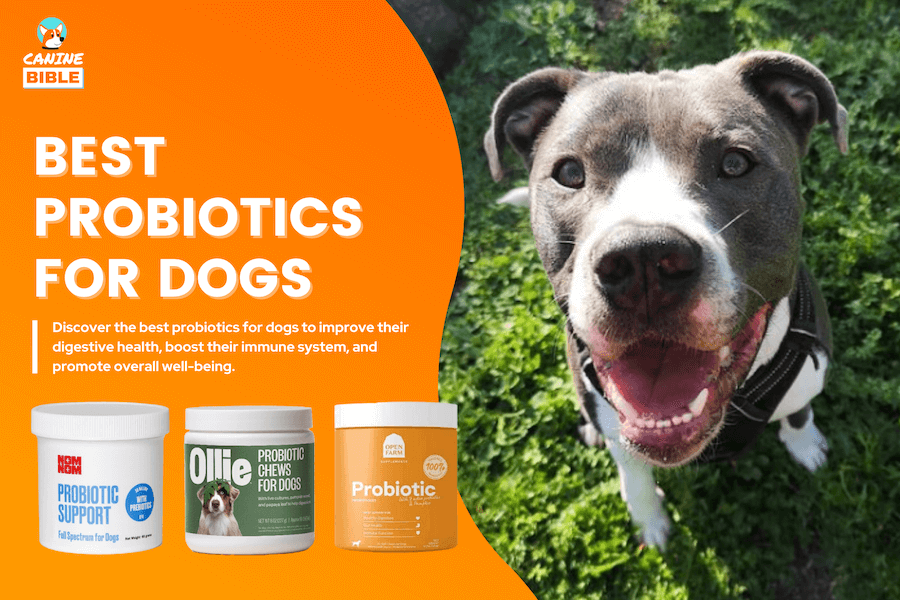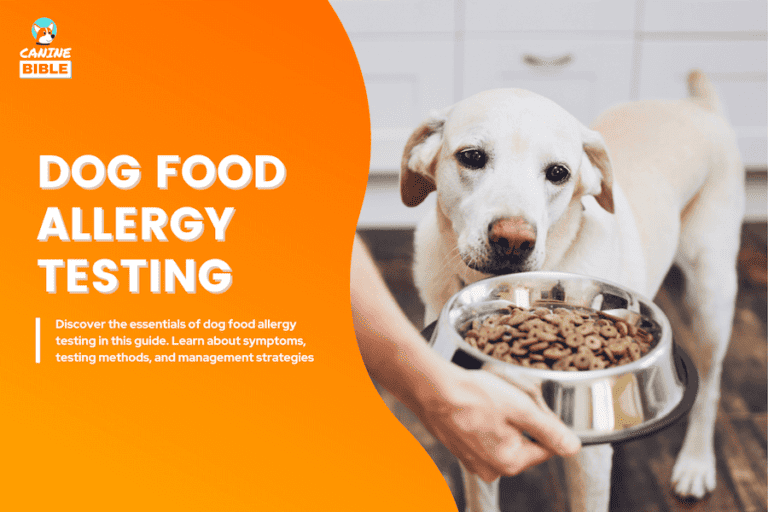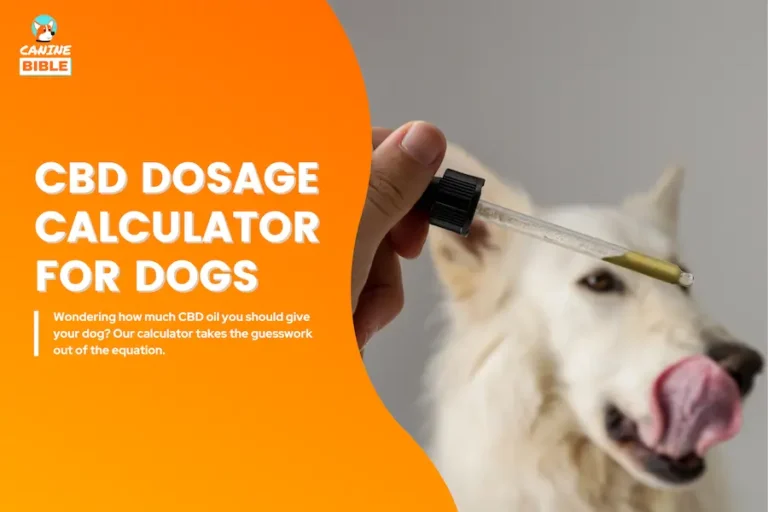Probiotics For Dogs: Everything You Need to Know

Canine Bible is reader-supported. We receive affiliate commissions via some of our links. This doesn’t affect rankings. Learn more.
Pet owners are always looking for ways to improve their dogs’ health, and probiotics have become a popular topic of discussion. Probiotics are known for their benefits in human digestive health, but can they also benefit dogs?
With the growing body of research supporting the benefits of probiotics for human health, it’s no surprise that pet owners are turning to these microorganisms to improve the well-being of their canine companions. Today we will examine the science behind probiotics for dogs, including their potential benefits, mechanisms of action, risks, dosages and safety considerations.
We hope to leave you well-equipped to make informed decisions about adding probiotics to your dog’s diet. Let’s get started!
- What Are Probiotics For Dogs?
- How Do They Work?
- What Do They Do For Dogs?
- Benefits
- The Research
- Are Probiotics Good For Dogs?
- Probiotic Strains
- What is CFU In Probiotics?
- Where To Buy?
- Side Effects
- Dosage
- Handling & Storing
- How Long to Work?
- Why Vets Recommend It
- Soil-Based Probiotics For Dogs
- Probiotics While On Antibiotics
- Conclusion
What Are Probiotics For Dogs?
Probiotics are beneficial bacteria that thrive in your dog’s body and, when ingested, provide a health benefit.[1]
Often, bacteria are perceived as harmful agents that cause illness. However, it’s essential to recognize that there are two types of bacteria — good and bad. Probiotics are made up of good bacteria that help keep your dog’s body healthy and working well. This good bacteria helps canines in many ways, including fighting off bad bacteria when they have too much.
Probiotics are integral to the broader concept of microorganisms and the body, known as the microbiome. Think of the microbiome as a diverse ecosystem where various organisms work in harmony to maintain your dog’s body health. This ecosystem consists of microscopic entities called microbes. Trillions of these microbes include:
Probiotics & The Dog Microbiome Relationship
A dog’s microbiome is unique. No two dogs have the same microbial cells. For a microbe to be called a probiotic, it must have several characteristics. These include being able to be isolated from a dog, survive in your dog’s intestine after being eaten, be beneficial, and be safe to consume.
Types of Dog probiotics
Dog probiotics can be found in various forms, including:
Where Do Beneficial Probiotics (Microbes) Live In Dog Bodies?
Probiotics primarily reside in a dog’s gastrointestinal (GI) tract, which includes the stomach, small intestine, and large intestine (colon). Probiotics can also be found on mucosal surfaces like the mouth, nose, respiratory tract, and skin. However, their concentration and diversity are generally higher within the GI tract.
How Do Probiotics Work For Dogs?
Probiotics work in dogs by supporting the balance and function of the gastrointestinal (GI) tract’s microbial ecosystem.
Here’s a closer look at how probiotics work in dogs:
It’s important to note that individual dogs may respond differently to probiotics, and not all probiotic strains offer the same benefits.
Consult a veterinarian to select the appropriate probiotic product and dosage for your dog’s needs.
What Do Probiotics Do For Dogs?
The main job of probiotics is to maintain a healthy balance in your dog’s body.
Think of it as keeping your dog’s body neutral. When your dog is sick due to illness, infection, antibiotic treatment, or other stressors, bad bacteria enter their body and increase in number. This knocks your dog out of balance. Bad bacteria are typically germs or pathogenic bacteria that cause diseases and infections, make dogs feel sick, or even die.
Dog probiotics fight off harmful bacteria and restore the balance of “good” and “bad” bacteria in your dog’s body, making your pet feel better. Once probiotics are inside your dog, they compete with pathogenic bacteria and crowd them out.
All dogs can benefit from probiotics, which aid digestion, restore balance to the intestinal flora, promote digestive system health, and modulate the immune system. Probiotics promote a healthy balance of gut bacteria in dogs and have been linked to many health benefits.
Here are just a few things probiotics can do for dogs
Dog Probiotics Benefits
Here is an overview of the key health benefits linked to probiotics.
Conditions That May Benefit From Probiotic Treatment
Dog probiotics offer a range of other benefits, including promoting intestinal microbial balance that helps maintain a healthy gut flora, which is essential for proper digestion and nutrient absorption. Moreover, emerging research suggests that probiotics may influence mood and emotions in dogs, as the gut-brain axis significantly regulates mental well-being. Lastly, probiotics have been found to reduce pain and swelling in some instances, as they can help modulate the immune system and decrease inflammation.
What Does The Research Say About Canine Probiotics?
Here is what the research states regarding dogs and probiotics.
It’s worth noting that there is a ton of anecdotal evidence—stories of individual success that support the effectiveness of probiotics on dogs, as well as some veterinarians swear by them.
Are Probiotics Good For Dogs?
Our experience and science back studies show that probiotics are good for dogs and can provide many benefits. Your veterinarian can prescribe probiotics to maintain a desirable intestinal microbial balance in dogs or treat gut issues.
Best Probiotic Bacteria Strains For Dogs
What strains of probiotics are good for dogs? What strains of probiotics do dogs need?
There are five main types of probiotic strains you can give your dog. Every probiotic strain has a unique function in your dog’s health and offers various beneficial properties. That’s why it’s crucial to understand these strains—comprehending each type of probiotic strain will assist you in selecting the most appropriate probiotic for your dog.
Pro tip: When buying a probiotic supplement for dogs, you must choose the right strain based on their health and medical needs.
Types of Probiotics Strain For Dogs
Most dog probiotics products in the market will contain the following kinds of strains:
Bacillus coagulans. A highly effective probiotic strain against several types of infectious diarrheas. This probiotic strain has been approved by the EU and the FDA’s Center for Veterinary Medicine for over ten years. Other proven health benefits in dogs include:
This probiotic is also administered to livestock to prevent yeast infections from harming their reproductive systems.
Enterococcus faecium. It has been shown to help maintain a healthy mix of bacteria in the dog’s stomach by replacing “bad” bacteria eradicated with “good” bacteria. It also has the following benefits:
Lactobacillus acidophilus. It protects against salmonella and campylobacter jejuni, bacterial disease-causing cramping, stomach pain, fever, and diarrhea. It also helps with the following:
L. rhamnosus, L. fermentum, L. reuteri, and L. salivarius are helpful thanks to their strong anti-microbial activity in the GI tract. They have been found to prevent or reduce canine intestinal infections.
Bifidobacterium animalis AHC7, according to research, helps with the following:
In one recent study using mice as subjects, B. animalis AHC7 protected mice against salmonella infection. Another report by Microbiology Veterinary concluded that B. animalis “has significant potential for improving canine gastrointestinal health.”[10]
Studies indicate that utilizing a combination of diverse probiotic strains yields the greatest advantages. The greater the variety of probiotic species, the more varied and balanced the colonization your dog will experience.
What Is CFU Or Colony-Forming Unit In Probiotics?
When purchasing probiotics for dogs, paying attention to the CFU count is crucial. CFU stands for “Colony-Forming Unit,” representing the number of live bacteria in a sample. In dog probiotic supplements, the CFU count refers to the quantity of live bacterial cultures found in each serving. For example, every scoop of Probiotic Miracle delivers 1 Billion CFU of species-appropriate probiotics for your dog.
As your dog digests a scoop of probiotics, the beneficial bacteria will begin to colonize and outcompete the harmful bacteria in their digestive tract. This is the reason they are called colony-forming units.
Where To Buy Probiotics For Dogs?
Don’t know where to start on your search for the best canine probiotic supplement? Where can I get probiotics for my dog? Most dog parents don’t know where to buy dog probiotics because there are many brands, and it’s hard to discern which is the best.
The best place to buy dog probiotics is an online or local pet store. You can use our guide on the best probiotics for dogs to find the best one based on your dog’s needs.
Dog Probiotic Side Effects
Are probiotics safe for dogs? Most dogs respond well to probiotics, and they are generally safe for most dogs when given the appropriate dosage.
However, some dogs may react negatively toward the supplement. Side effects may include:
These symptoms are common with any significant dietary adjustment in dogs and humans. Inflammation, infection, and allergies may also be present. Talk to your veterinarian if your dog does not respond well to probiotics or if you have any concerns about its digestive health.
Probiotic Dosage For Dogs
How many CFUs per scoop should I give my dog?
It’s advised to ease into probiotic treatment by under-dosing first to allow your furry friend’s tummy to adjust to this nutritional change. After your dog’s digestive system has adapted to this supplement, you can switch the manufacturer’s dosing guidelines.
The appropriate amount largely depends on the specific health issue being addressed. A lower CFU count should suffice for the daily use of dog probiotics to maintain digestive and immune health (between 1-3 billion CFUs).
A higher CFU count is recommended for more severe illnesses and health concerns (such as inflammatory bowel disease, post-antibiotic treatment, or food allergies), ranging from 4-10 billion CFUs. While research indicates that healthy dogs can tolerate higher counts of probiotics without adverse effects, it is not advisable to administer large amounts of probiotics to every dog indiscriminately. Consult your pet healthcare provider for guidance if you consider increasing the dosage.
According to WebMD, there isn’t a standard dosage amount. Dog probiotic supplements (available as powders, capsules, or chews) each come with dosage and frequency of use recommendations that you should follow.
Dog Probiotics vs. Dog Prebiotics
While both probiotics and prebiotics contribute to maintaining a healthy gut microbiome, they work in different ways. Probiotics introduce live bacteria directly into your dog’s digestive system, while prebiotics provides nourishment to support the growth of existing beneficial bacteria. In other words, prebiotics feed probiotics. Prebiotics are types of fiber that nourish and promote the development of good bacteria (probiotics).
Sometimes, a combination of probiotics and prebiotics, known as synbiotics, may be the best approach to support your dog’s gut health. Synbiotics ensure that the good bacteria introduced through probiotics have the necessary nutrients to thrive and multiply.
Handling & Storing Dog Probiotics
Proper handling and storage of dog probiotics are essential to ensure the live bacteria remain active and effective. Here are some tips on how to keep dog probiotic bacteria alive:
How Long Does It Take For Probiotics To Work In Dogs?
Your dog’s unique gene makeup, age, health, bacteria already in its body, and diet affect how long it takes for probiotics to work.
Probiotics can start working from 24 hours to a few days or weeks, depending on their strength and the health condition being treated. Contact your vet if you don’t notice any improvements within a few days or if symptoms worsen.
The most important points to keep in mind to see the fastest results are: (i) Matching the symptom to the strain, (ii) the correct CFU dose (CFU) (iii) Keeping bacteria alive.
Why Do Vets Recommend Dog Probiotics?
Here are some reasons vets highly recommend dog probiotics.
Soil-Based Probiotics For Dogs
Soil-based probiotics, also known as spore-forming or soil-based organisms (SBOs), are probiotics derived from the soil. These probiotics consist of naturally occurring, spore-forming bacteria that are highly resilient to environmental changes and can survive harsh conditions, such as high temperatures and acidic environments. This makes soil-based probiotics much more effective than traditional probiotic strains because they can deliver more viable probiotics to the small intestine. Some studies suggest classic probiotic strains are less likely to survive to the same extent.[11] [12]
Soil-based probiotics are bacteria naturally found on the earth. One of the most common types of soil-based probiotics (bacillus) has been used to ferment foods for hundreds of years.
Additionally, most dog probiotics are produced using dairy, which may be less effective and potentially problematic for dogs with lactose intolerance. A significant advantage of soil-based probiotics is that they are vegan, eliminating allergy concerns. If you’ve tried other types of dog probiotics without success, soil-based dog probiotics might be the solution for your pet.
Dog Probiotics While On Antibiotics
Yes, you can give probiotics to dogs while on antibiotics. If your dog is under antibiotics, feeding probiotic supplements may reduce the possible antibiotic stress, such as side effects. Probiotics will repopulate the good bacteria killed by the antibiotic restoring and maintaining good bacteria levels. This can contribute to a quick elimination of the infection. Probiotics can also counteract the side effects of antibiotics by restoring beneficial bacteria that may have been disrupted during treatment.
Should You Feed Probiotics To Dogs?
Probiotics can be a beneficial addition to a dog’s diet, as they can help promote a healthy digestive system, boost immunity, and reduce inflammation. However, it is essential to choose the right type and dose of probiotics and consult with a veterinarian before giving them to your dog. Not all dogs may need probiotics, and some may have underlying health issues that can be affected.
Probiotics should not substitute for a well-balanced diet, regular exercise, and veterinary care. By taking a holistic approach to your dog’s health and wellness, including proper nutrition and regular veterinary checkups, you can help ensure that your furry friend lives a happy and healthy life.
Sometimes digestive problems are not related to chronic GI problems, but your dog’s diet is the root of the problem. Consider all-natural food blends such as vegan dog food or fresh dog food if that’s the case. Many studies indicate that these diets may benefit dog gut health. If you want to dive deeper into your dog’s gut health, performing an at-home dog gut health test can help you gain insight into your dog’s microbiome health status.
Like It? Subscribe & Share!
Canine Bible authorship represents the unified voice of our entire editorial team and our in-house veterinarians rather than a single author. Each article, blog post, and review published under the Canine Bible name undergoes a rigorous review process, involving all team members to guarantee accuracy and up-to-date in accordance with the latest veterinarian research. This collaborative effort is an integral part of our editorial process and aligns with our four pillars of content creation. This approach ensures our content is backed by expert knowledge and factual information, offering our readers reliable, actionable, and trustworthy content.






![Dog Allergy Testing Cost: How Much Will You Pay? [Update 2024]](https://www.caninebible.com/wp-content/uploads/2022/08/how-much-does-dog-allergy-testing-cost-768x512.jpeg)

